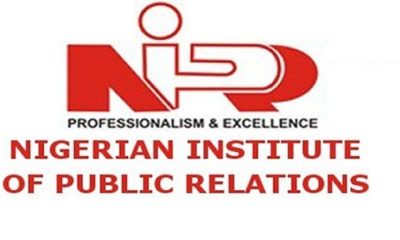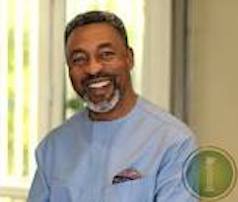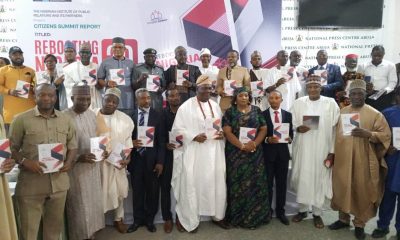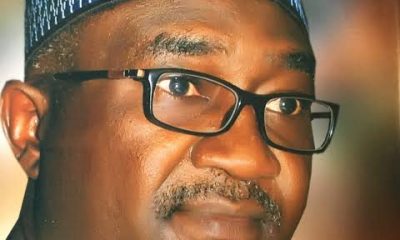NEWS
At National Summit, NIPR Identifies Trust, Dialogue As Key Nation-building Elements
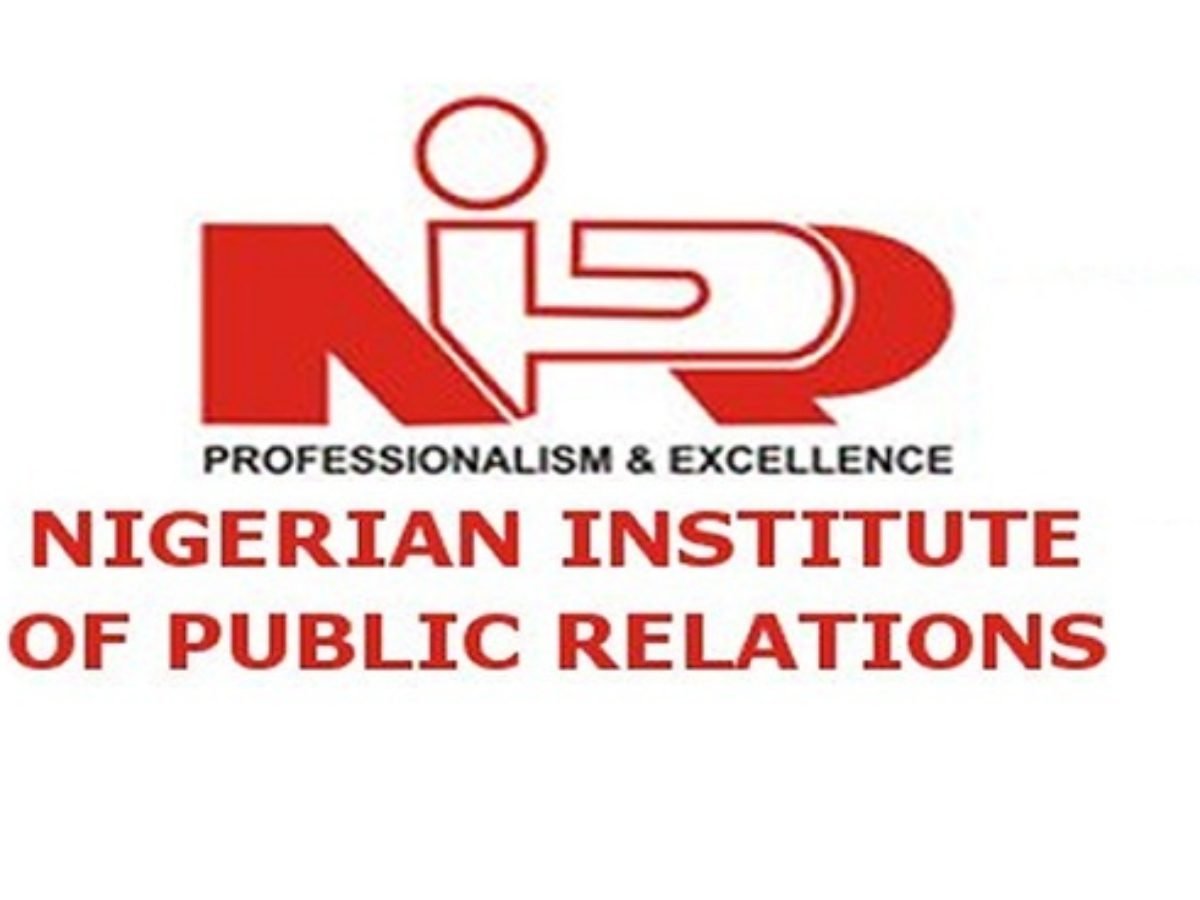
By Blessing Bature-Akpakpan
The president, Nigerian Institute of Public Relations (NIPR), Mukhtar Zubairu Sirajo has said the Institute has identified trust as a key element in nation-building and the role of dialogue in societal well-being and development, hence the decision to take up the challenge.
The president, who spoke at the Citizens Summit for National Integration, peace and security in Abuja on Tuesday, disclosed that “We need not to look far to see that relationships amongst our people have broken down, resulting in mutual suspicion and diverse forms of antagonism, and driven by ethno-religious and other primordial differences that have become the face of our common heritage.
”Sirajo said, realising that at the core of the mandate of the Public Relations profession is the birthing and sustenance of mutually beneficial relationships and mending them where they crack or even break down, Institute came to the conclusion that Nigeria needed more than a shot in the arm in this regard.
“No nation thrives and progresses in an atmosphere of hatred and distrust,” he stated in a speech at the opening ceremony of the Summit.
According to him, seeming rapid loss of hope in our nationhood by the youth calls for a new approach, based on citizens -participation that is solution- driven.
“It is said that “every society should discover its dream; either to betray or fulfil it.” Hence, Nigerians as a people should constantly re-assess the focus of our dream, x-ray the dynamics in the system, for the continuous evolution of a better way forward to our glorious destination, since nation building is always a work in progress.
“Our nation, no doubt has witnessed some serious challenges in the past few decades in the process of our social evolution and democratic consolidation. In the midst of these contradictions have been the seeming rapid loss of hope by many, especially the youth, in the promise of our nationhood; challenging economic realities, social distrust, exclusion, weakening of social cohesion, and presently the challenge of insecurity in different parts of the country.
“We therefore, cannot continue to fold our arms and watch as these ugly trends keep unfolding. Something has to be done urgently.
“As a professional and patriotic body, part of whose mandate and area of expertise is relationship building and mending, the Nigerian Institute of Public Relations understands the enormous task incumbent on it in playing strategic roles in achieving national development through objective scanning of the environment, identifying challenges, and constructively engaging all relevant stakeholders to try to reverse this ugly trend.
With this in mind, the NIPR with the support of our esteemed partners came up with the idea of this Citizens Summit for National Integration, Peace and Security, which has as its theme: “Reopen Conversation , Rebuild Trust.”
Chairman of Access Bank, Dr. Ajoritesere Awosika, who spoke at the occasion said there were a plethora of issues that have bred the slow disintegration of the Nation, pertinent among which he said was the lack of communication and trust deficit on the side of government and its citizens and amongst individuals.
“A quick glance at the current situation of the nation tells an all too familiar tale; the vigorous campaigning of politicians for political offices amidst the heavy siege of kidnappers over the people, while the economy declines even further into an abysmal situation shows the dire situation of things.
“We need to leverage every tool and every sector to foster national integration. The crucial role of the economy, for one, in fostering national integration has been thoroughly undermined. In a country where the economic resources are scattered across the various regions, there is a dearth of regulations and regulatory bodies that will aid the movement of goods and services”.
“The overriding goal of national dialogue processes is to promote peace, unity, reconciliation and a shared sense of identity – all critical elements of sustainable peace, but all in short supply in the Horn of Africa. Having wide-ranging mandates including political reforms, constitution making and peacebuilding, national dialogues are political processes that aim to reach a new social contract between interest groups and communities in a country”.
“In Nigeria, however, national dialogues have not always been well implemented; and at other times citizens have wanted them, but governments haven’t recognized their importance. In instances where their importance has been recognised, the resolutions or promises haven’t been followed through
“This has to change, and it starts with us – holding each other accountable and challenging the status quo” he stresed.
NEWS
FG Imposes 7-year Ban on New Federal Tertiary Institutions

The Federal Executive Council (FEC) has approved a seven-year moratorium on the establishment of new federal tertiary institutions.
Dr Tunji Alausa, Minister of Education announced the approval, after Wednesday’s FEC meeting, presided over by President Bola Tinubu at the Presidential Villa, Abuja.
He explained the ban applies to all federal universities, polytechnics, and colleges of education.
According to Alausa, the decision aims to address systemic decay caused by unregulated expansion.
”What we are witnessing today is duplication of new federal tertiary institutions, a significant reduction in the current capacity of each institution, and degradation of both physical infrastructure and manpower.
”“If we do not act decisively, it will lead to marked declines in educational quality and undermine the international respect that Nigerian graduates command.”
“We are doing this to further halt decays in tertiary institutions which may in future affect the quality of education and consequently cause unemployment of graduates from some of these institutions.”
Alausa noted Nigeria currently has 72 federal universities, 108 state universities, and 159 private universities with similar trends in polytechnics and colleges of education.
He pointed to a growing mismatch between the number of institutions and available student enrollment.
He cited a northern university with fewer than 800 students but over 1,200 staff, calling it unsustainable.
The minister described the moratorium as a bold corrective measure by the Tinubu administration.
He said the government would now focus on upgrading existing institutions, improving infrastructure, boosting manpower, and increasing capacity.
“We need to improve the quality of our education system and increase the carrying capacity of our current institutions so that Nigerian graduates can maintain and enhance the respect they enjoy globally.”
The minister however announced that the Council approved 9 new private universities out of the 79 active requests pending applications.
”Several of these applications have been in the pipeline for over six years, with investors having already built campuses and invested billions of Naira,” he explained.
“Due to inefficiencies within the NUC, approvals were delayed. We have since introduced reforms to streamline these processes, and today’s approvals are a result of clearing this backlog.”
(NAN)
Foreign News
CAF Sanctions Kenya Again over Crowd Trouble

The Confederation of African Football (CAF) has sanctioned African Nations Championship (CHAN) co-host, Kenya, for the second time in as many weeks over security breaches.
In a statement made available on Monday evening, the continental governing body said that it has limited entry to the 48,000-seat Moi International Sports Centre.
It also said that, known as Kasarani Stadium, can accommodate 27,000 fans for Sunday’s Group A match between Kenya and Zambia.
CAF said only electronic ticket holders would be allowed into the stadium, with thermal tickets prohibited.
The governing body warned that Kenya’s matches could be relocated from Kasarani Stadium if organisers fail to prevent further breaches.
“We trust these measures will be applied swiftly to protect competition’s integrity, ensure fan safety, and uphold confidence in Kenya’s commitment to the tournament,” CAF said.
The sanctions follow incidents on Aug. 10 when Kenya defeated two-time winner Morocco 1-0 in spite of playing the entire second half with 10 men.
The win put Kenya top of Group A with seven points.
The debutants would reach the quarterfinals with at least a draw against winless Zambia.
Last week, Kenya’s football federation was fined nearly 20,000 U.S. dollars for security lapses during the team’s 1-0 win over DR Congo in the tournament opener on Aug. 3.
In the latest case, CAF cited major lapses, including stadium gates and restricted service areas being overrun by ticketless spectators and holders of government-distributed physical tickets.
It also accused security personnel of losing control at exit points and allowing breaches of the perimeter fence that enabled thousands of ticketless fans to enter.
CAF had expressed alarm over the use of tear gas and flash grenades, reports of live ammunition fired near spectators and staff, and violent incidents such as stone-throwing at security personnel.
It also cited unsafe vehicle movement in spectator areas, inadequate police response, and the lack of medical incident reports in spite of injuries being reported.
Organisers were further criticised for insufficient communication tools and the absence of CCTV coverage at critical entry points.
Education
Varsity Don Advocates Establishment of National Bureau for Ethnic Relations, Inter-Group Unity

By David Torough, Abuja
A university scholar, Prof. Uji Wilfred of the Department of History and International Studies, Federal University of Lafia, has called on the Federal Government to establish a National Bureau for Ethnic Relations to strengthen inter-group unity and address the deep-seated ethnic tensions in Nigeria, particularly in the North Central region.
Prof.
Wilfred, in a paper drawing from years of research, argued that the six states of the North Central—Kwara, Niger, Kogi, Benue, Plateau, and Nasarawa share long-standing historical, cultural, and economic ties that have been eroded by arbitrary state boundaries and ethnic politics.According to him, pre-colonial North Central Nigeria was home to a rich mix of ethnic groups—including Nupe, Gwari, Gbagi, Eggon, Igala, Idoma, Jukun, Alago, Tiv, Birom, Tarok, Angas, among others, who coexisted through indigenous peace mechanisms.
These communities, he noted, were amalgamated by British colonial authorities under the Northern Region, first headquartered in Lokoja before being moved to Kaduna.
He stressed that state creation, which was intended to promote minority inclusion, has in some cases fueled exclusionary politics and ethnic tensions. “It is historically misleading,” Wilfred stated, “to regard certain ethnic nationalities as mere tenant settlers in states where they have deep indigenous roots.”
The don warned that such narratives have been exploited by political elites for land grabbing, ethnic cleansing, and violent conflicts, undermining security in the sub-region.
He likened Nigeria’s ethnic question to America’s historic “race question” and urged the adoption of structures similar to the Freedmen’s Bureau, which addressed racial inequality in post-emancipation America through affirmative action and equitable representation.
Wilfred acknowledged the recent creation of the North Central Development Commission by President Bola Tinubu as a step in the right direction, but said its mandate may not be sufficient to address ethnic relations.
He urged the federal government to either expand the commission’s role or create a dedicated Bureau for Ethnic Relations in all six geo-political zones to foster reconciliation, equality, and sustainable development.
Quoting African-American scholar W.E.B. Du Bois, Prof. Wilfred concluded that the challenge of Nigeria in the 21st century is fundamentally one of ethnic relations, which must be addressed with deliberate policies for unity and integration.

